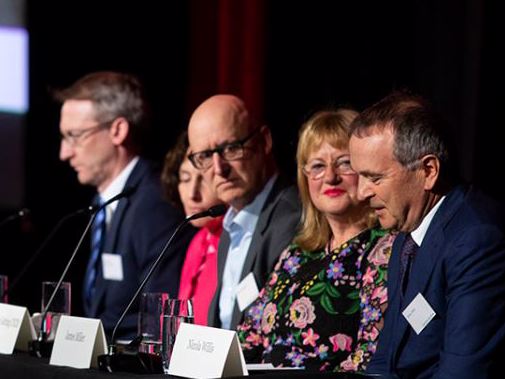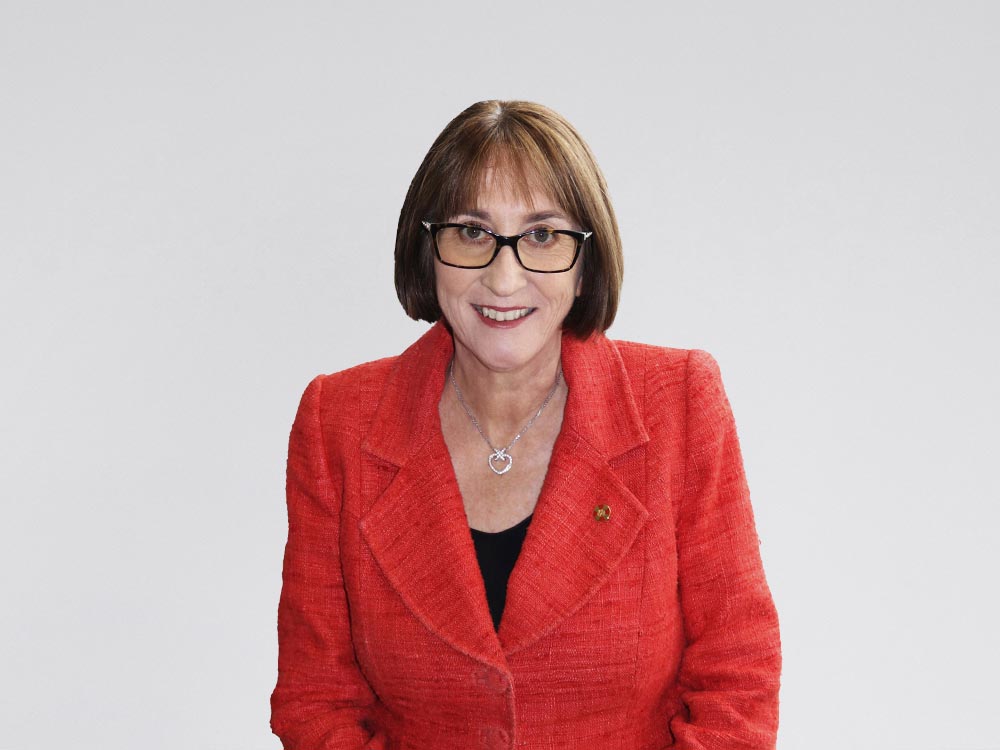The challenges and opportunities for governors in building better businesses
On Tuesday 2 August 2022, MinterEllisonRuddWatts held its annual Corporate Governance Symposium for directors and executives at the Cordis in Auckland.
The Symposium began with a panel discussion featuring highly regarded governors Alison Gerry (Chair of Sharesies and Infratil, director of ANZ Bank and Air New Zealand and founding member of On Being Bold), Dean Hamilton (Chair of Fulton Hogan and director of The Warehouse Group, Auckland International Airport and Tappenden Holdings), Theresa Gattung (Chair of AIA New Zealand, Telco Technology Services and Tend, and co-founder and director of My Food Bag), and James Miller (Chair of Channel Infrastructure and NZX, and director of Mercury and Vista Group).
Nicola Willis (Deputy Leader of the Opposition and National Party Finance Spokesperson), the Symposium’s keynote speaker, followed the panel discussion with her observations on key focus areas for governors, including workforce challenges, engaging effectively with Government, and climate change.
On the topic of the challenges and opportunities for governors in building better businesses, several themes emerged from the Symposium, including:
The importance of purpose
A clearly defined purpose is vital for an organisation to attract and retain talent, set its strategic plan and prioritise actions, and build a community around the business (comprising team members, customers and other stakeholders) that is just as passionate about the organisation’s purpose as its governors and executive team.
Governors should be asking themselves whether their organisation’s purpose is clear and strong enough to guide them when faced with tough strategic decisions and trade-offs, and whether that purpose inspires team members, customers and other stakeholders to be advocates for their business.
Share knowledge and stay connected
As businesses grow, and employees and teams become more specialised, governors should be identifying opportunities to encourage greater interaction between colleagues and teams.
Agile ways of working, which are being adopted by a growing number of organisations, encourage interaction between teams and can lead to more efficient and effective decision making and end-to-end problem solving. More engaged teams typically have a greater understanding of the other areas of the business that have an impact on the work that they do (and vice versa).
For organisations that do not follow scaled agile practices, the challenge and opportunity for governors is to design ways in which different areas of the business are encouraged to come together to share their specialist knowledge and expertise.
The director community in New Zealand is incredibly well-connected. Governors should be using those connections to their advantage, to help their organisations and executive teams build their own networks to share knowledge and collaborate to meet head-on the challenges that their organisations face.
Navigating the sea of stakeholder capitalism
One of the big challenges facing governors currently is how to allocate resources to ensure that their organisation responds to the ways that their various stakeholders (customers, staff, shareholders, lenders, communities, insurers, politicians) think about issues like sustainability, social equality, health and safety, and diversity and inclusion.
While these issues are not necessarily new, the public conversation has been elevated in recent times, and visibility over organisations’ responses has increased. The balance of power in the discourse on these issues can shift quickly. Governors and organisations need to be on top of these issues and should view the strategic planning process as an opportunity to ensure that their resources are allocated most effectively. The issues, and answers, will be different for every business.
Regardless of the industry or sector that their organisations operate in, directors need to understand what their organisation has to do in order to survive and prosper over the long term – and then ensure that resources are prioritised accordingly.
Appoint the right CEO
The most important resource for a board is the CEO. Governors need to appoint, and then motivate and retain, good CEOs. An effective CEO will:
- Work collaboratively with management and the board to set the organisation’s strategy and purpose.
- Surround themselves with good people and create an environment that gets the best out of them. Those good people will then invariably hire other good people.
- Set a positive tone for how the organisation interacts with its stakeholders.
Governors also need to be proactive and purposeful in terms of CEO succession planning. Involving your current CEO can be a powerful tool in the succession planning process, to help ensure that their replacement is the right person for the next phase of the business.
Creating and leading inspired teams in a challenging world
One of the current challenges facing governors is how to create and lead inspired teams (and keep them inspired) in a world dealing with the tail end of the pandemic, war in Europe, and increasingly regular adverse climate events (among other challenges).
The global economy is also facing headwinds, with consumer, business and investor sentiment around the world all extremely low, and many markets in, or approaching, “bear market” territory. Record rates of inflation around the world (as a result of supply chain disruptions, soaring food and commodity prices and (some are arguing) ‘Modern Monetary Theory’) is creating challenges for most economies around the world. The question is how many of these challenges have already been priced by the market (and to what extent). There is also a risk that central banks overreact in a bid to combat inflation, which could lead to recession.
An entrepreneurial mindset can help to face these challenges and turn them into opportunities, by taking calculated risks and viewing each challenge as a problem solving opportunity. However, large companies are often not wired with this entrepreneurial mindset (with risk avoidance the more typical default setting).
Historically, New Zealand has built its success and reputation on such an entrepreneurial mindset. In the modern context, a uniquely New Zealand solution could involve drawing on te ao Māori, with its strong intersection with environmental, social and governance (ESG) factors. At a personal level, we should remind ourselves of “the power of one” – what each of us does, matters, and history is full of examples of the incredible things that strong individuals can achieve with an entrepreneurial mindset.




